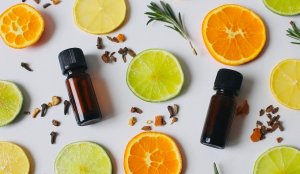Perfumery is both a science and an art.
Defining a quality fragrance is elusive and subjective because for some the balance of the note pyramid makes all the difference, and for others longevity, depth and complexity mark the distinction between a compelling scent and an unremarkable one.
While there’s no question that the top, middle, and base notes all blend into the ultimate perception of a scent, their painstaking procurement, creation and development are the mainstays of a quality fragrance.
One rule of thumb that differentiates a cheap perfume from a quality scent is the fact that inexpensive fragrances tend to be sweeter.
This is largely due to the fact that this caliber of perfume is generally directed to a younger consumer base.
Expensive fragrances have more longevity than their cheaper counterparts and even though less expensive perfumes can replicate a pricier version’s top notes, without the proper essential oils, the scent fades less than a half hour after application.
The concentration level of the essential oils in a fine fragrance indicates its intensity and how long it will last on the skin. This marks one aspect of a quality perfume.
Fragrances are also designated according to the scent family they belong to, and the notes they contain.
There are four major perfume concentration classifications: parfum with between 15% and 30% aromatic compounds; eau de parfum contains 8–15%; eau de toilette ranges from 4% to 8%; and eau de cologne has between 2% and 5% aromatic compounds.
Italian perfumers living in Cologne, Germany, in the 1700s invented the term, eau de cologne. It was a scent comprised of rosemary and citrus essences that were dissolved in wine.
Today, however, the term, ‘cologne’, refers more widely to any weakly concentrated perfume and/or a masculine fragrance.
Alpha Aromatics and Quality Fragrances
A fine fragrance is only as good as the essential oils it contains. Behind the scenes of perfume creation, the purchaser of these oils is the one who determines the ultimate quality of any manufactured scent.
This factor is so vital that it can be considered a sacred art among superior perfume purveyors.
The enduring allure of fragrance lies in its elusive and ethereal properties, which collectively transform into sensory poetry to our noses.
Our perfumers (Roger Howell pictured below) and fragrance chemists are at the top of their game when it comes to addressing the trend of translating essential oils into wondrous aromas.

Not only do their quality fragrances enhance the lives of millions of consumers all over the world, each client is important and treated equally, regardless of the size of their account.
All clientele represent a commitment that includes building personalized relationships with each and every one. Their superior formulations symbolize the culmination of hard work and years of experience merging the art of fragrance with the knowledge of industrial science.
Their fragrances are painstakingly researched and reflect the latest trends in perfume formulation and cutting edge technologies.
Relevant Fragrance Studies and Statistics
The Monell Chemical Senses Center, which is located at the University City Science Center research campus in Philadelphia, Pennsylvania, is the only non-profit scientific institute in the world dedicated to research on taste and smell.
New research conducted by Monell and published in Journal Plus One with funds supplied by Unilever has indicated that women are considered more attractive when they are in the presence of an alluring scent.
Another study concerning the psychology of fragrance that was conducted in 2003 by Rachel Herz concluded that factors influencing the wearing of perfume in North America often coincide with those that affect fashion choices.
Results also indicated that young women were highly influenced in their fragrance selections by peers and celebrities, while middle-aged women were more inclined to rely on their own judgments.
Women over sixty made their scent decisions based largely on the opinions of those closest to them.
This same landmark study revealed several other elements that influenced perfume selection. It indicated that the choice of a particular scent was dependent on either consumer mood at the moment or the altering of that mind-set at the time of purchase.
Personality, self-perception as well as the setting for the perfume (job interview or romantic encounter, etc) also influenced purchasing decisions.
A Few Little Known Facts About Fragrance Creation
- Nerfertem was the ancient Egyptian god of perfume and luck, albeit his life did not begin as such. According to legend, his godly status was elevated via his association with the intensely fragrant and intoxicating blue water-lily flower.
- When perfumer, Jean Carles, created the iconic fragrance, Tabu, back in 1932, he was instructed by the Dana Perfume Company to create a fragrance a prostitute would wear.
- Perfumer and former model, Germaine Cellier, created the mossy, leathery scent known as Bandit in 1947. It is said that her inspiration for this fragrance arose from the smell of models changing their panties at a Robert Piguet fashion show.
- Castoreum is an ingredient extracted from a beaver’s abdominal gland, and it is often used in leather-scented perfumes. It is sometimes also the “natural flavoring” found in many raspberry and strawberry-flavored desserts. Its fruitiness disguises its animal smell. Also, it has now been reproduced synthetically.
- The world’s first recorded chemist was a woman named Tapputi, who was mentioned in a cuneiform tablet from the 2nd millennium BC in Mesopotamia. She was a perfume-maker who used flowers, oil, and calamus along with cyperus, myrrh, and balsam, and mixed them with other aromatic substances.
- Beginning students in the art of fine perfumery are required to identify a scent that consists of up to 250 diverse notes and specify the identity of each one. This difficult test is the reason why there are only 50 fully-fledged perfumers (also known as Noses) in the world.
- Perfumer, Jean Charles, was said to have insured his nose for USD $1 million! Later in his life he lost his olfaction, and yet he continued to create perfume masterpieces, not unlike Beethoven, who wrote exquisite music long after losing his sense of hearing.
- A Parisian butcher created the fragrance, Bacon, back in 1920 by blending eleven essential oils and the essence of bacon.
- Most modern perfumes have between 10 and 250 ingredients.
- In 1190, commercial perfume production began in Paris, and from there, it blossomed into a massive industry throughout Europe via scented textiles, such as gloves.
What Makes A Quality Fragrance Supplier?
Today, most fragrances are laden with synthetic aroma materials, even those that are extremely costly. There are no shortcuts or shortcuts in the world of fine fragrance design and creation.
Our perfumers know that success demands a dedication to creativity, quality and efficiency from everyone along the supply chain.
All fragrances are the sum of all their parts and their success depends on a number of factors, some of which include but are not limited to: the quality of all the ingredients; their purity; their cost and their safety.
1) They Must Provide Quality Raw Materials
Fragrance development begins with a high quality supplier of essential oils. He or she has the important job of researching and examining natural raw materials in order to source only the highest quality ingredients.
Then the ingredient purchaser has the responsibility to ensure that selected essential oils are harvested, stored, distilled and shipped properly.

There are a number of factors that affect the quality of essential oils. These include: (for organics) whether or not the plants from which the oils were extracted were ever sprayed with pesticides; the climate and rainfall of their place of origin and the chemicals used to extract them.
Other important concerns to a quality fragrance oil purchaser involve the manner in which the oils are packaged and handled and how they are stored after production.
Too much light, heat or oxygen can negatively alter the quality of essential oils, and their durability is contingent upon storage in a cool place in low headspace, airtight containers.
2) Offer Competitive Costs And Freight Policies
Cost can be an obvious benchmark when it comes to evaluating the quality of essential oils. That old adage about ‘if it’s too good to be true, it probably isn’t’ certainly applies here.
Essential oils, by their very nature, are never cheap because so much time and effort goes into the process of their extraction and formulation into fine fragrances.
A quality essential oil purchaser does his or her homework, researches competitive prices and then selects the best price for their client base. He or she often offers a free freight policy to good customers in addition to discounts on volume purchases.
Oils that demand a higher price correlate directly to the quality of a particular distillation of oil. This opens the door to temptation for unscrupulous fragrance oil purchasers to adulterate (alter) their essential oils.
A reputable quality fragrance oil supplier will come with his or her stamp of approval from companies that have earned a stellar reputation for honesty in business practices after which free purchase samples are submitted for laboratory analysis and the perfumers perform a final “sniff test” prior to purchase and upon delivery.
3) A Fragrance Designer Must Be Creative
Our creative perfumers are more than just chemists working on formulas. They are artists hard at work constantly innovating and perfecting the ancient art of perfume creation.
Roger Howell, our master perfumer, a highly recognized perfumer in the industry, is known for both his creative and scientific expertise, which he utilizes to compose thousands of unique fragrances.
Today, Howell is the Vice President of Alpha Aromatics, and he is a man who wears many important hats. He trains lab technicians and upcoming apprentice perfumers, lab technicians and sales staff about perfumer.
Every early morning, before any of his other duties, he is in the lab researching new materials and stretching the boundaries of industrial science to create new formulations, which are without end and limited only by a lack of imagination.
4) Fragrance Ingredients Must Meet All Safety Standards
The fragrance industry spends approximately $8 million (annually) in joint research on the safety of fragrances, and much more at the individual company level.
A quality fragrance oil purchaser must guarantee that every produced scent meets the specified safety requirements before it goes out the door to the market place.

The Research Institute for Fragrance Materials, also known as RIFM, is the scientific hub for the International Fragrance Association (IFRA).
It was founded in 1966 for the purpose of analyzing, evaluating and distributing scientific data and encouraging safety standards for the use of fragrance ingredients.
The IFRA team acts as a watchdog and ensures that usage standards are put into practice by the world’s fragrance houses.
5) The Element of Purity And Fragrance Ingredients
Quality fragrance oil purchasers must guarantee that their essential oils are pure and free of dyes, residues and other toxins.
Purity of essential oils is mandatory in order for the resulting scents to be stable and deliver what they promise to consumers.
One wrong move here can topple a purchaser’s reputation that took years to build. Purity is a tricky concept because an essential oil can be pure and also be of poor quality.
Aromatherapy standards for essential oil quality and purity are the highest in the industry because these characteristics affect their therapeutic value, aroma and color.
Some aspects can be quantifiably tested, but others that depend on olfactory responses, are much more subjective.
At Alpha, we have invested heavily in the highest technical analytical instrumentation to provide the highest quality control standards for our customers.
What is An Impure Ingredient?
An impure essential oil is one that has been deliberately altered.
There are several ways this is done. Blending a higher quality essential oil with a lower quality version of the same type and marketing it as pure is a popular unscrupulous practice.
This can also include adding synthetics to improve the aroma of an essential oil or vegetable (carrier) oils and not disclosing this dilution to the consumer.
Our QC lab is always acutely aware of any faux submissions from its suppliers.
6) Fragrance Designers Must Be Flexible And Responsive
A fragrance manufacturer must respond to its client’s needs when it comes to a quick turnaround on orders and sudden changes in a specific project.
A quality fragrance oil purchaser must learn to be flexible and go with the flow, so to speak.
7) They Must Have The Ability to Listen Carefully
Although somewhat akin to being responsive, that is only part of the effective quality fragrance oil purchaser’s expertise.
The whole bag includes knowing how to listen to both what is being said and what message is being implied.
The ultimate goal is to make their client’s dreams come true, which translates into the ability to listen with three ears (the two ears nature gave them and a third invisible one, which understands the unspoken or unexpressed emotions and memories that fragrance triggers).
8) Must Have An Acute Knowledge About Customer Service
A quality fragrance oil purchaser must be heavily involved with customer service and must be up to date about the ins and outs concerning trends, applications, packaging and product fillers.
In this aspect, our customer service company reputation soars and has been unblemished since our inception.

The power of this concept cannot be understated, as businesses cannot exist without customers, and catering to their needs is the key to developing brand loyalty and consumer retention.
When a satisfied customer is pleased, they will return due to a positive association.
9) A Quality Fragrance Designer Understands The Value Of Time
Time and maintaining inventory points with uninterrupted flow are incredibly important and both must be managed impeccably in order for it to benefit the quality fragrance oil purchaser and his or her consumer base.
Respect for the element of time is vital to the successful operations of any quality fragrance oil purchaser that goes far beyond ensuring a quick turnaround on business orders.
Time management involves working smarter and not harder and getting more done in less time.
Understanding the difference between real time and clock time and how to use both to succeed commercially are important concepts to any quality fragrance oil purchaser.
Clock time passes equally. It has 60 seconds in every minute, 60 minutes in every hour, 24 hours in every day and 365 days in every year.
Ultimately, clock time is irrelevant because quality fragrance oil purchasers live in real time, which is a world in which time always flies and can easily get ahead of business operations.
Real time is also completely mental and can be manipulated to suit the individual needs of quality fragrance purchasers.
In Conclusion
The endless tapestry of fragrance is multi-layered and dependent on the quality of all of its components.
While uncelebrated, those behind the scenes who seek out the best ingredients that money can buy are the key to the creation of superior fragrances that have withstood the test of time.
If you’re a brand owner or purchaser, senior chemist, product developer, business development manager, packaging technologist or product development scientist, submit an inquiry today and see what magic our fragrance oil purchasers can do for your company.
Final thought on quality fragrances: Perfume is like a parentheses, a moment of peace, love and sensuality in between the disturbances of modern living. ~ Sonia Rykiel
This article was created with the insight, direction and approval of our chief perfumer, Roger Howell, our President and CEO, Arnold Zlotnik, and our Alpha management and staff. Learn more about Mr. Howell, our company’s mission, our degreed and credentialed staff as well as the passion we place behind every fragrance we develop.
 alpha aromatics®
alpha aromatics®